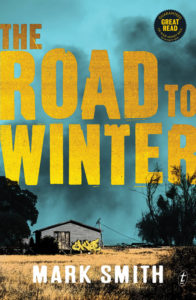 We asked Mark Smith to give us some background to his debut novel, The Road to Winter which has just been released by Text Publishing. This novel looks like being very popular, not only among young adult audiences.
We asked Mark Smith to give us some background to his debut novel, The Road to Winter which has just been released by Text Publishing. This novel looks like being very popular, not only among young adult audiences.
The Road To Winter (TRTW) began as a short story called Breathing In And Out. I thought it had the potential to be developed into a full length novel. My initial intention wasn’t to write a YA novel, but once I found the voice of Finn, my 16-year-old narrator, it moved more and more in that direction.
In my life away from writing, I run a Year Nine outdoor residential campus for a large Melbourne boys’ school, meaning I have spent a lot of time in the headspace of adolescent boys. Hence, finding Finn’s voice wasn’t that difficult. I have also spent many days in the outdoors, surfing, hiking, riding and canoeing with the students, giving me ample opportunity to observe the way they interact with the natural environment.
The setting of TRTW, on the west coast of Victoria, is integral to the telling of the story. I wanted the environment to be like another character, something that Finn not just interacted with but grew to  understand and respect. This aspect of the story becomes all the more relevant when Rose (and later, Kas), the two escaped Sileys, or asylum seekers, are befriended by Finn. They are Afghani girls who have been sold into slavery in a country they don’t know or understand. And now, with Finn’s help, they need to survive on the run.
understand and respect. This aspect of the story becomes all the more relevant when Rose (and later, Kas), the two escaped Sileys, or asylum seekers, are befriended by Finn. They are Afghani girls who have been sold into slavery in a country they don’t know or understand. And now, with Finn’s help, they need to survive on the run.
It’s been noted that Finn has a strong moral code that directs his actions, even though all law and order has broken down in the dystopia. He has lost both his parents but he has inherited their sense of what’s right and wrong. In some ways his judgments are still those of a fourteen-year-old – though he is sixteen at the time he tells the story, his last memories of what civilised society looked like are of his small coastal community before the virus. Since then he’s had to survive on his own. When Rose and Kas arrive they challenge his moral code, arguing it’s no longer relevant in a world without order. The girls’ have only known cruelty and abuse so their sense of right and wrong has been skewed by the harshness of their treatment.
In writing the novel for a young audience I wanted to ensure that there was hope amid the negative aspects of the dystopia – and this hope is largely embodied in Finn and his ingrained sense of justice. We see it in all his interactions, both with friends and foes. He has a warm heart and a yearning for companionship, albeit tied up in in the awkwardness of adolescence and speech impediment that makes communication difficult.
TRTW was always intended to be the first book in a series. Just how long that series will be is undecided. I have a three book contract with Text. I am currently writing the sequel and the story is expanding to include new characters and a broader view of the dystopian society Australia has become following the virus.


